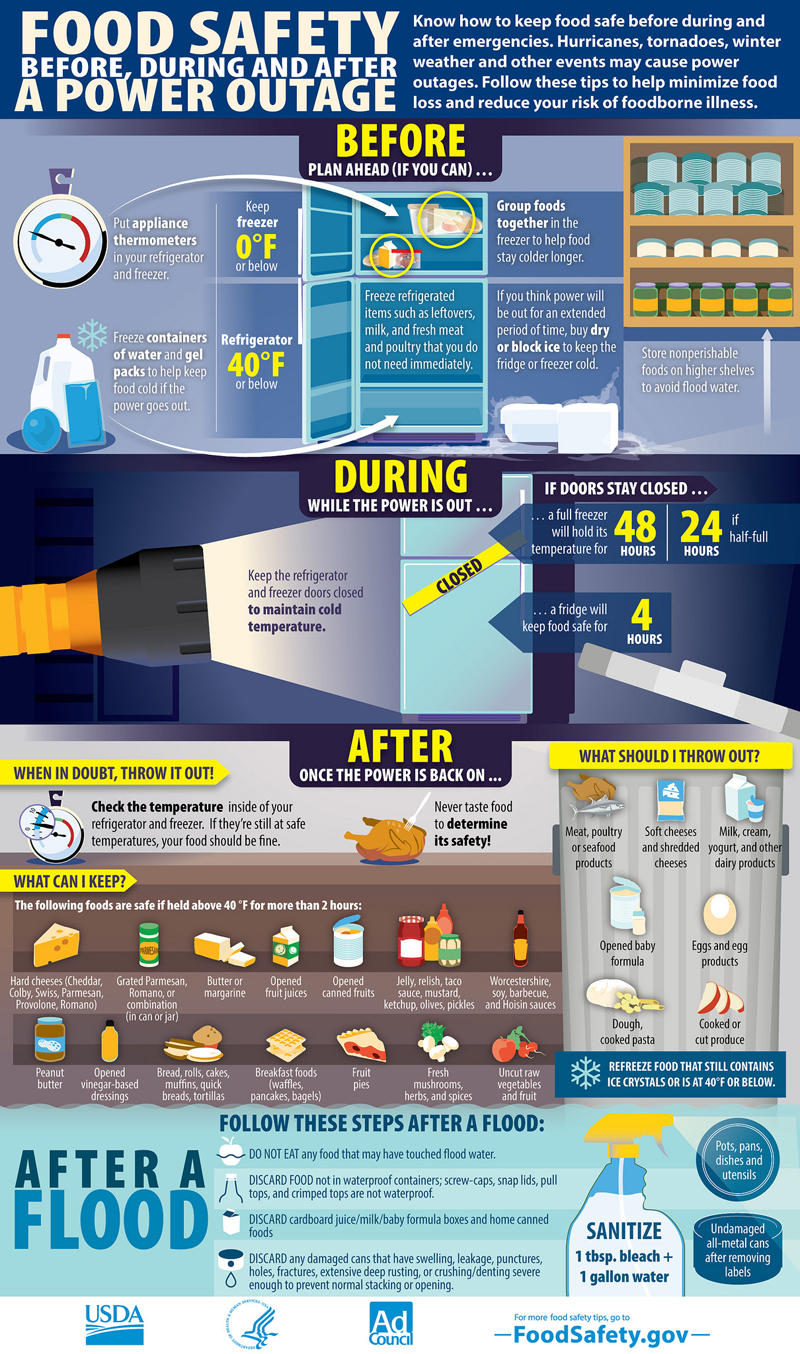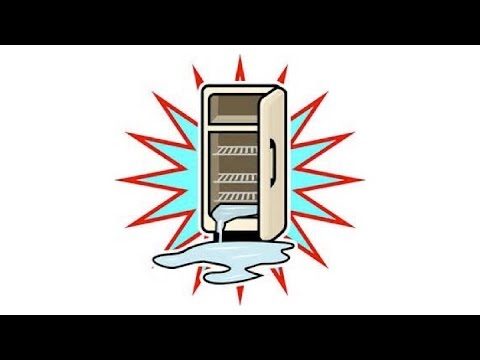BY: MEGAN RAY NICHOLS
There is a good reason many foods need to be refrigerated and/or fully cooked before you eat them. Actually, there are more than 250 good reasons in the form of bacteria-induced diseases commonly found in raw or undercooked food [1]. Bacteria such as Salmonella, Campylobacter jejuni, Shigella, Escherichia coli (E.coli), Listeria monocytogenes, Vibrio and Clostridium botulinum can lead to a variety of symptoms including vomiting, abdominal pain, fever, and more [2].
Food borne illnesses are definitely something to avoid. Unfortunately, if you happen to suffer a power outage, cooking foods or keeping them refrigerated can prove problematic. Here are some tips and rules to keep in mind that prevent contracting a food borne illnesses should you lose power.
Avoid an Outage to Begin With
Of course, the best way to keep food from going bad during a power outage is to avoid the outage to begin with. This could mean taking steps to ensure your circuit breakers are in top condition [3].By maintaining your circuit breakers, your appliances will receive a steady amount of electricity. Plus, in the event of more power going to your home than necessary, the circuit breaker will be able to stop electricity from frying your fridge, freezer, or other home appliances.
If the outage extends to the rest of your block or neighborhood, it’s beyond your control. In this case, try to leave your refrigerator and freezer closed for as long as possible. You won’t know how long the outage will last, so keeping your food cool for as long as possible will give you the best chance of preventing spoilage. Food should last in a refrigerator up to 4 hours without opening it, or seldom opening it. However, you’ll want to check the internal temperatures of all food items [4]. Any food that has been temped at over 40 degrees Fahrenheit for 2+ hours is unsafe to eat and should be properly disposed of. Food in the freezer will last a bit longer, depending on how full it is, with a completely full freezer lasting 48 hours and a half full freezer lasting 24 hours [5].
Prepare in Advance
Similar to having an emergency safety kit stashed in the trunk of your car, you should put together a food safety kit at home to make sure you’re prepared for an emergency [6].
Items you should pack in the kit include one or more coolers, a decent amount of shelf-stable foods, and a digital quick-response thermometer so you can easily check the internal temperatures of your food.
The thermometer is key. It will help you quickly and accurately check which foods are safe and which aren’t when the outage is over.
If it appears the outage may last for a day or longer, pack coolers with ice to help keep freezer items frozen.
Remember These Rules
Depending on what type of food you’re dealing with, there can be a number of things to keep in mind if the power goes out [7].
Rule 1: Get rid of any perishable food, such as meat, poultry, fish, eggs and leftovers, which have been temped above 40 degrees for more than two hours.
Rule 2: Items in your refrigerator should be fine for up to four hours after a power outage, assuming you don’t open the door often. Items in your freeze should be fine for 24-48 hours depending on how full your freezer was to begin with. Remember: the less you open the refrigerator or freezer doors, the longer the food will stay cool.
Rule 3: Hard cheeses such as cheddar, Colby, Swiss, Parmesan and provolone should be fine if they happen to be above 40 degrees for more than two hours. The same goes for processed cheese and grated Parmesan or Romano. Hard cheeses tend to last longer because the aging process removes moisture from them; this makes them naturally drier, which makes it difficult for bacteria to grow and rot the cheese [8].
Rule 4: Soft cheeses like brie, cottage, Monterey Jack and mozzarella should be discarded, as should shredded and low-fat cheeses since it’s easy for bacteria to grow in these environments in a short amount of time. With the power off and temperatures rising, your fridge is an ideal breeding ground for bacteria.

https://www.flickr.com/photos/memebinge/16176752047
Know Which Foods Are Probably “OK”
You now know of many foods that should be discarded if they are held above 40 degrees Fahrenheit for two hours or more. Here are some foods that will remain safe for a bit longer [9]:
- Among dairy products, you can hold on to butter or margarine. Everything else should be discarded, including opened baby formula.
- Opened fruit juices and canned fruits are safe, as are whole fresh and dried fruits. The only fruit product to worry about is cut fresh fruit.
- There is a fairly lengthy list of sauces, spreads and jams that will be safe: peanut butter, jelly, vinegar-based dressing, Worcestershire, soy, taco and barbecue sauces, and ketchup and mustard. Pickles and olives will also be fine. The main things to worry about in this area are fish or oyster sauce, opened cream-based dressings and opened jars of spaghetti sauce.

http://www.gocomics.com/theargylesweater/2010/11/22
When it comes to food safety following a power outage, there are a lot of things to keep in mind. Many of the rules are common sense, but if you don’t know if something will be OK to eat, it’s always better to be safe than sorry. When it doubt, throw it out!

Want to learn more? Come check out our Instagram and Facebook for weekly updates, news, and food science!
References:
- Food Safety During a Power Outage. Washington State Department of Health.
- Foodborne Illness. National Institute of Diabetes and Digestive and Kidney Diseases
- Circuit Breakers. BCS Switchgear.
- Refrigerated Food and Power Outages: When to Save and When to Throw Out. Foodsafety.gov.
- Power Outages: How Long Does Food Last in the Fridge and Freezer? Still Tasty.
- Food Safety During An Emergency. American Red Cross.
- Refrigerated Food and Power Outages: When to Save and When to Throw Out. Foodsafety.gov.
- How do hard cheese and soft cheese differ? Shelf Life Advice.
- Refrigerated Food and Power Outages: When to Save and When to Throw Out. Foodsafety.gov.
Megan Ray Nichols is the editor of Schooled By Science and a freelance science writer. When she isn’t writing, she enjoys baking, going for walks and watching movies. Follow her on Twitter @nicholsrmegan.






I found it interesting how you mentioned how you should put together a food safety kit in the event of a power outage. While my power is being installed in my new house, the power to the kitchen can become unreliable and I don’t know if I should trust the food in the fridge. I will definitely keep this in mind as we continue building our new home!